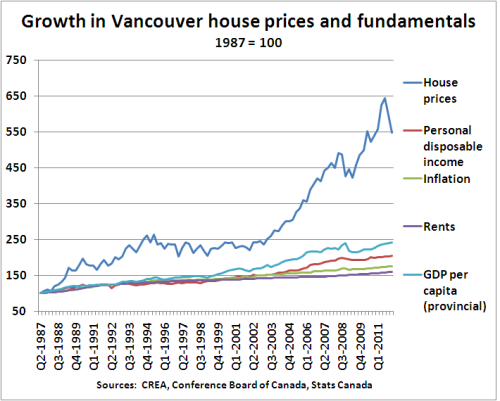“About to sign lease on 1 year new house built by Asian owner, 1800+ sf, pulled off MLS recently due to no buyer. Now about to be rented to yours truly at ~35 years Price-to-Rent ratio after talking down rent by $100/m. [Thus 420 monthlyrent:price ratio. -ed.]Landlord still has a couple houses near completion. Who knows what happens to the tenant if the landlord goes bankrupt?”…
“I’m moving from a 1Br+den 670 sq ft condo at 283 months (23.6 years) rent, to (the aforementioned) 3Br newer house at 415 months (34.6 years) rent. Definitely makes more financial sense to rent than buy. Viewed a 3Br 1000sq ft newer condo few days ago at 305 months (25.4 years) rent, but passed (interesting to note that property manager is a realtor, guess managing client’s property might be what’s keeping them busy these days!)
– VMD at VCI 17 Aug 2012 10:00pm and 18 Aug 2012 11:22am
An example of a ‘speculative hold’. The owner believes prices will rise in future and is holding the property not for rental yield, but for assumed future price increases.
We are of the opinion that a good percentage of this kind of inventory will be put on the market at significantly lower prices, as it becomes clear that a downward trajectory for prices is establishing itself.
And, yes, this will be disruptive to tenants. The rental market is less stable through a speculative mania in housing, and the unwinding thereof.
– vreaa
Other current sky-high Price:Rent ratio anecdotes from the same VCI thread:
“I am living in Richmond with an (assessed value) : (rent) ratio of about 285.
Strata fees and property taxes not included, why buy now?”
– Anonymous 18 Aug 2012 10:04am
“I’m renting a house in SE Burnaby. Price to rent is somewhere between 350-370 on the conservative side. My best friend is the landlord and I’ve urged him to consider selling. But he will have nothing to do with it. Already has over $1.5mil RE exposure with little other savings. Oh yeah, still looking to buy another investment property because “RE does so much better than the stock market”. Just can’t save people from themselves.”
– How much?? 18 Aug 2012 10:27am
“Here is a unit that has been listed on CL for months (available now) for $2650 per month. The same units are listed for sale at $839K to $879K. So even if they get their asking rent the PR is 316 plus.”
– Anonymous 18 Aug 2012 12:36pm
“Beat you all. 4br house on Ontario. 2012 sale $1.35M. Monthly rent $2850, 2 yr lease. Price/rent 474. I love living here but wouldn’t buy at half the price.”
“Our landlord purchased the property earlier this year as an “investment”. I really can’t understand their business model. The house is an original, nicely-maintained bungalow. New paint, new dishwasher etc.
It’s not a quick flip (we have a 2-year lease) and it’s not a tear down and rebuild, which might make sense. The landlord is shelling out $3k or whatever per month to hold the property. They seem to be invested for the long term.
Of course the potential downside for us is a forced move if the house is sold. We figured that by the end of our lease the house will likely be underwater so that the landlord would not be in a position to sell. We will see how that goes.
I should add the landlord couple are very nice people and I don’t wish them any financial hardship.”
– No Money Down 18 Aug 2012 12:37pm and 19 Aug 2012 10:10am
“I have a whole house (unlike many, home owners, I have no tenants in the basement to worry about) on a nice street off The Drive, assessed at a little over 410 months’ rent.”
– N 18 Aug 2012 1:56pm
“I’m in a 3 bedroom house (we have the place to ourselves), 5 year lease for $1600/mo. House is worth $750,000 based on comps for a ratio of 468.”
– Vulture Fun 18 Aug 2012 11:34pm
“I pay $850 a month for a condo in Surrey. Same unit 2 floors up sold for $253,000 in late 2011. So a ratio of 297:1. You guys are insane with your 400′s ratios.”
– ScubaSteve 19 Aug 2012 12:39am
“I am the winner. I pay 4,400 for a 3,800 ft 6 bedroom (or is it 7?) house in west side.
Assessed close to $3.0 million. For now this is a 660 multiplier.
At the higher price points, it gets more and more un-economic to own and rent these houses out.”
– Van Coffee 19 Aug 2012 8:48am
“I’m at 489 but if I take off the huge strata fees that my landlord pays I go to 696. Strata and ppty tax eat up exactly 50% of my rent cheque. Not a lot left to pay the mortgage and occasional special assessment.
BTW…for all you haters who think we renters are basement dwellers who are broke, I’m writing this poolside in Osoyooss. Thanks landlord!”
– McLovin 19 Aug 2012 11:01am
“For the record – we are in a $1.5M Condo. Strata and taxes are over 1,000 per month and the rent is 3,500 gross (2,500 net of landlord costs). This give you 600.
Property value is no more than the day we moved in.
This represents a $200,000 plus savings and building of equity by renting (we built equity by renting – – – sounds strange).”
– ZRH2YVR 19 Aug 2012 4:52pm

















































